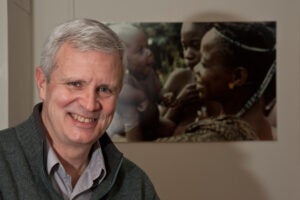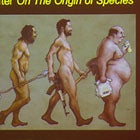Tag: Evolution
-
Health
Evolution and ailments
The pressures of human evolution could explain the apparent rise of disorders such as autoimmune diseases and autism, researchers say. Some adaptations may even help such ailments persist.

-
Campus & Community
Phys Ed: Is Running Barefoot Better for You?
Daniel Lieberman, PhD, a professor of human evolutionary biology at Harvard University, studies and periodically practices barefoot running. His academic work focuses in part on how early man survived by evolving the ability to lope for long distances after prey, well before the advent of Nike shoes. There “is good evidence that humans have been…
-
Campus & Community
Mouse set to be ‘evolution icon’
A tiny pale deer mouse living on a sand dune in Nebraska looks set to become an icon of biology. Within just a few thousand years, generations of the mice have evolved a sandy-coloured coat camouflaging themselves from predators…
-
Science & Tech
Trading energy for safety, bees extend legs to stay stable in wind
New research shows some bees brace themselves against wind and turbulence by extending their sturdy hind legs while flying. But this approach comes at a steep cost, increasing aerodynamic drag and the power required for flight by roughly 30 percent, and cutting into the bees’ flight performance.
-
Health
Evolution explored from all angles
From humanity’s close relationship to chimpanzees to the missing link between land and sea creatures, the Harvard Museum of Natural History (HMNH) has capped off a year celebrating Darwin and “On the Origin of Species” with a new exhibit that puts evolution front and center.
-
Health
Biology department evolves at FAS
Earlier this month, the Faculty of Arts and Sciences (FAS) made official what scientists worldwide have known for years: Harvard is a hotbed of research and teaching in the field of human evolutionary biology — the study of why we’re the way we are.
-
Arts & Culture
Performance rings old bones with sounds of ‘selection’
The Harvard Museum of Natural History’s galleries rang with music Tuesday evening (April 28) as the facility’s fossils made room for musicians performing seven original classical pieces written in honor of the 150th anniversary of the publication of Charles Darwin’s “The Origin of Species.”
-
Arts & Culture
Chance favored expedition leader in ‘missing link’ discovery
A graphic in an undergraduate geology textbook serendipitously led to the 2004 discovery of the missing link between fish and land animals far in the Canadian Arctic, one of the creature’s discoverers said during an April 16 lecture at Harvard.
-
Health
Lighting the fuse for the Cambrian Explosion
Harvard paleontologists have shed new light on one of the most enduring mysteries of life on Earth: the origins of the creatures that suddenly appear in the fossil record 530 million years ago in an event known as the Cambrian Explosion.
-
Health
Culture skews human evolution
The rise of agriculture 10,000 years ago meant the end of the hunter-gatherer lifestyle for which human beings had been optimized by millions of years of evolution and the beginning of an era where culture encourages habits unhealthy for us and for the world around, with uncertain evolutionary outcomes.

-
Health
Watching evolution in real time
In 1831, the young Charles Darwin set off on the H.M.S. Beagle, a Royal Navy sloop bound for detailed surveys of South America. He took with him the first volume of the massive trilogy “Principles of Geology” by Scottish geologist Charles Lyell. (He had the other volumes sent later.)
-
Health
Darwin’s empathy, imagination highlighted
On Feb. 12, the world celebrated the 200th anniversary of Charles Darwin’s birth. Much was made of his key idea, natural selection, and how it still resonates and informs science in the 21st century.
-
Health
Two reasons to fete Darwin
Small is beautiful. Small may also be powerful. Judging from a copy on display at Harvard’s Houghton Library, the book that changed the world is only 8 inches high and 5 1/2 inches wide.
-
Science & Tech
Humanity may hold key for next Earth evolution
Human degradation of the environment has the potential to stall an ongoing process of planetary evolution, and even rewind the evolutionary clock to leave the planet habitable only by the bacteria that dominated billions of years of Earth’s history, Harvard geochemist Charles Langmuir said Thursday (Nov. 13).
-
Health
A single gene leads yeast cells to cooperate against threats
An ingenious social behavior that mobilizes yeast cells to cooperate in protecting each other from stress, antibiotics, and other dangers is driven by the activity of a single gene, scientists report this week in the journal Cell. The cooperating cells use the same gene, dubbed FLO1, as a marker for detecting “cheaters,” cells that try…
-
Campus & Community
Susan Carey awarded Rumelhart Prize
Susan Carey, a Harvard psychologist whose work has explored fundamental issues surrounding the nature of the human mind, has been awarded the 2009 David E. Rumelhart Prize, given annually since 2001 for significant contributions to the theoretical foundation of human cognition.
-
Health
Across species, genes evolve to minimize protein production errors
Scientists at Harvard University and the University of Texas, Austin, have found that genetic evolution is strongly shaped by genes’ efforts to prevent or tolerate errors in protein production.
-
Campus & Community
Ernst Mayr
At a Meeting of the Faculty of Arts and Sciences on May 20, 2008, the Minute honoring the life and service of the late Ernst Mayr, Alexander Agassiz Professor of Zoology, Emeritus, was placed upon the records. Mayr helped lay the foundations of contemporary evolutionary biology.
-
Health
Potent new strategy for mapping animal species shakes up tree of life
Since the 1859 publication of Charles Darwin’s “Origin of Species,” efforts to trace evolutionary relationships among different classes of organisms have largely relied on external morphological observations.
-
Health
Eating meat led to smaller stomachs, bigger brains
Behind glass cases, Harvard’s Peabody Museum of Archaeology displays ancient tools, weapons, clothing, and art — enough to jar you back into the past. But the venerable museum offered a jarring moment of another sort in its Geological Lecture Hall last month (March 20). Paleoanthropologist Leslie Aiello delivered a late-afternoon talk on diet, energy, and…
-
Health
Punishment doesn’t earn rewards
Individuals who engage in costly punishment do not benefit from their behavior, according to a new study published this week in the journal Nature by researchers at Harvard University and the Stockholm School of Economics.
-
Health
Protein folding: Life’s vital origami
The way proteins fold, and the good and bad effects of this molecular phenomenon, are what keeps biologist Susan L. Lindquist busy. Lindquist Ph.D. ’76, a Radcliffe Fellow this year, is an award-winning professor and researcher at the Massachusetts Institute of Technology (MIT) and a former director of the Whitehead Institute. She shared her insights…
-
Health
Homing in on features of ‘humaniqueness’
Shedding new light on the cognitive rift between humans and animals, a Harvard University scientist has synthesized four key differences in human and animal cognition into a hypothesis on what exactly differentiates human and animal thought.
-
Arts & Culture
Taxonomist Carl Linnaeus on show at HMNH
Carl Linnaeus believed that the fruit of the Tree of Knowledge was not an apple but a banana. He came to this conclusion in 1737, while studying plant specimens at Hartecamp, the estate of George Clifford, a wealthy Dutch banker and director of the Dutch East India Company. Clifford collected exotic plants from around the…
-
Health
DNA reveals Neanderthal redheads
Ancient DNA retrieved from the bones of two Neanderthals suggests that at least some of them had red hair and pale skin, scientists report this week in the journal Science. The international team says that Neanderthals’ pigmentation may even have been as varied as that of modern humans, and that at least 1 percent of…
-
Arts & Culture
Harvard scientists predict the future of the past tense
Verbs evolve and homogenize at a rate inversely proportional to their prevalence in the English language, according to a formula developed by Harvard University mathematicians who’ve invoked evolutionary principles to study our language over the past 1,200 years, from “Beowulf” to “Canterbury Tales” to “Harry Potter.”
-
Health
Biologists remember landmark theory
Forty years ago, Edward O. Wilson and Robert H. MacArthur described how size and isolation determine how many species an island can support. Last week, biologists gathered to mark the theory’s anniversary, calling it a “pivotal point” in ecology’s relatively short history.
-
Health
‘Speed limit’ found on rate of evolution
Harvard University scientists have identified a virtual “speed limit” on the rate of molecular evolution in organisms, and the magic number appears to be six mutations per genome per generation — a rate of change beyond which species run the strong risk of extinction as their genomes lose stability.
-
Health
Losos’ lizards give evolutionary clues in island experiments
Tiny islets in the Bahamas have proven useful laboratories to illustrate natural selection’s effects on island lizards, which saw their legs lengthen, then shorten as ground-dwelling predators drove them into the trees.
-
Health
Primates expect others to act rationally
When trying to understand someone’s intentions, nonhuman primates expect others to act rationally by performing the most appropriate action allowed by the environment, according to a new study by researchers…


